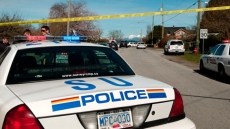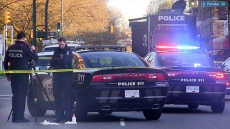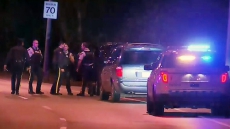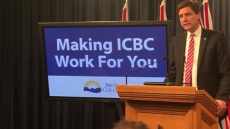VICTORIA — The lives of 25 homeless or marginally housed people in Victoria only started to get better when they were close to death, says a University of Victoria study released Thursday.
Researchers followed the people for two years during the study, which concluded that many of them received the best health care available only when they had reached the end of their lives.
Kelli Stajduhar, a professor at the university's school of nursing and Institute on Aging and Lifelong Health, said 13 people died during the study and the health status isn't known for the 12 who survived while the research was underway.
The study, "Too Little; Too Late: How we fail vulnerable Canadians as they die and what to do about it," finds that people living on the streets are in a world of unmet needs, multiple losses, persistent grief and trauma.
Stajduhar said the study recommends better training throughout the health-care system to inform providers about the barriers to care endured by marginalized people, including end-of-life support.
It called for improved polices to help health workers understand why the homeless avoid care and aren't getting treatment for life-threatening conditions until it's too late.
Stajduhar said many participants said they were often told by doctors and health providers that their lifestyles of addiction, poverty and homelessness could lead to an early death, but early diagnosis of potential health conditions was limited.
"Even if they have advanced illness, that's not really what they are focusing on," she said. "They're focusing on the need to get housing. The need to get food. The need to just live daily life, get money to live, which is kind of sad. They're just in survival mode while they're dying."
The study participants, 16 men and 9 women, ranged in age from 19 to 81. Of those people, 15 had cancer, three had uncontrolled diabetes, two suffered from chronic lung disease and five were not aware of their life-threatening diagnosis.
Of the 13 people who died; five had access to palliative care for more than two weeks, five received palliative care for less than two weeks and three people did not receive palliative care.
"For the people who died, when they were able to come in contact with service providers who had palliative orientation to care that was sometimes the best kind of care that they had gotten, ever," said Stajduhar.
The study does not use the real names of those involved but included details of interviews, where at least two of the participants said they went to a hospital suffering with pain, were diagnosed with cancer and then were given months to live.
A homeless man identified as Cliff spoke glowingly of his palliative care treatment.
Cliff told researchers he went to a hospital emergency ward complaining about severe back pain and was told he had advanced cancer of the spine and less than six months to live.
His last days were spent in comfort.
"I am surprised at how much is actually available to me, and how well I’ve been treated," he told researchers and is quoted in the report. "And since I got the cancer, it's been nothing but positive reaction from anything I do need or wherever I've had to go to get help. I am getting top-rate service. So you know, I can't complain about anything right now."
But dying wasn't as easy for others in the study, it said.
A 56-year-old man called Sammy, suffering with late-stage chronic obstructive pulmonary disease and schizophrenia, died alone in supportive housing, in a pool of his own vomit with his oxygen mask hanging at his side.
"Death and dying in this population occur in some palliative care settings," the report says. "But more likely they will die in hospital or alone, on the street and in vehicles, or in shelters or transitional housing."






